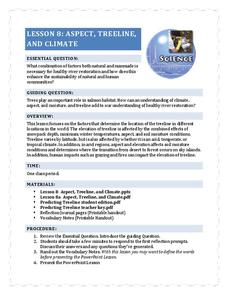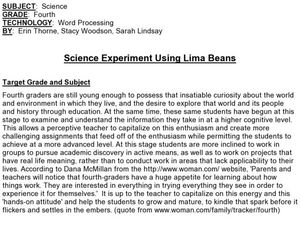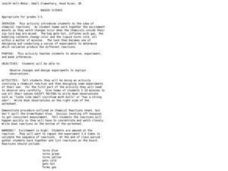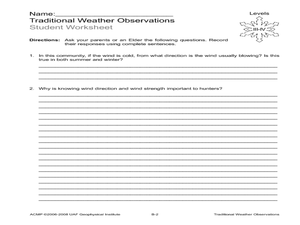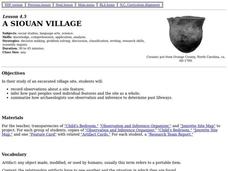Curated OER
Colored Drops
Students examine the properties of a liquid that contains water and food coloring and a liquid that contains water, food coloring and a liquid detergent. They interpret their data, describe properties, and make reasonable explanations...
Cornell University
Nano What?
The size of a nanoparticle is difficult for pupils to grasp. A hands-on experiment is designed to give your classes perspective. Learners analyze different sports drinks for the content of electrolytes as an introduction to nanoscale....
Curated OER
Sunrise/Sunset
Third graders discovver what causes the dramatic colors of a sunset by seeing the changing color of light as it passes through a clear container of water to which milk is gradually added. They measure the liquids and observe what happens...
Odell Education
Scientific Process and Experimental Design
The scientific method keeps you from believing only what you want to believe — it expands your mind. The lesson introduces the eight steps in the scientific process and how to design an experiment to biology scholars. Live insects...
University of Georgia
Using Freezing-Point Depression to Find Molecular Weight
Explore the mathematical relationship between a solvent and solute. Learners use technology to measure the cooling patterns of a solvent with varying concentrations of solute. Through an analysis of the data, pupils realize that the rate...
Curated OER
It's a Gas! Or is it?
Examine the effects of temperature and pressure on solubility and the states of matter of ocean water. Learners make inferences about the unique chemistry of ocean water at different depths. They engage in an activity related to...
Curated OER
The Nitrogen Cycle
The nitrogen cycle is the focus of a well-designed science lesson. In it, learners see that plants and animals produce waste products and decompose after death. Many of the waste products include nitrogen which is absobed by other...
Curated OER
Layers of the Rainforest
What a great way to discuss the rainforest! Learners discuss the importance of adaptation in the environment and how it is linked to survival. They use critical thinking and inference skills to place animals and insects in the different...
NASA
Let's Investigate Mars
Take your science class on a hypothetical field trip to Mars with an engaging astronomy instructional activity. After first learning about NASA's Mars rover missions, young scientists plan their own scientific investigations of Earth's...
Curated OER
Dinosaur Tracks and Critical Thinking
Get your young scientists excited about geology through the study of dinosaur tracks! They will use their power of observation to learn how tracks are made and use critical thinking strategies to suggest a scenario in which they were...
Curated OER
The Carbon Cycle
Here is an interesting science lesson. Pupils discover that carbon, just like water, is absolutely necessary for all living things to survive. They study how it cycles through nature, become familiar with the periodic table, and look at...
Curated OER
A Hilly Ride
Different types of energy are the focus of this science resource. Learners identify situations in which kinetic and potential energy are exchanged. They conduct an in-class inquiry which leads them to discover that there is a limit to...
National Park Service
Aspect, Treeline, and Climate
Head to the treeline and beyond to examine how this feature of the landscape affects weather and climate, which gives scientists clues about its health. Class members' observations of photographs provide the data that drives the...
Towson University
Looking Into Lactase: Guided Inquiry
Milk does a body good ... unless, of course, someone is lactose intolerant. Pupils play the role of pharmaceutical scientists in a guided inquiry lab about lactase. Lab groups collaborate to learn more about lactose intolerance, how...
Curated OER
Saltwater Science
Students conduct an experiment that shows them how salt water allows things to float. In this salt water lesson plan, students mix ingredients together to create salt water and observe how it makes the oceans dense. They then interpret...
Curated OER
Science Experiment Using Lima Beans
Fourth graders tie together elements about the world and their environment. Students incorporate styles of higher order thinking skills. Students measure skills of observations, conclusions, inferences and predictions.
Curated OER
Red, Green, and Blue Mystery Liquids! Hypothesis or Inference?
Eighth graders are actively involved in the scientific method and inquiry as they form quick hypotheses based upon a teacher set of mystery liquids. They determine the need to make additional observations of the liquids.
Curated OER
Weather Observation Journal
Young scholars research weather patterns. In this weather lesson, students read Chester Noongwook's Rules of Weather Observation and keep a weather journal for one month. Young scholars observe the weather patterns throughout the month.
Curated OER
Baggie Science
Students observe and describe a chemical reaction. For this chemistry lesson, students record observations of the materials they will be using, then follow a written procedure to perform the experiment in a baggie and record their...
Curated OER
Traditional Weather Observations
Learners explore traditional methods of weather observation. In this weather instructional activity, students interview grown-ups regarding wind. Learners learn how winds can help forecast weather.
Curated OER
Science: Birds in Flight
Young scholars identify and examine adaptations in birds that enable them to fly. They conduct Internet research to relate these adaptations to the physics of flight. Students observe birds in flight and describe their behavior and...
Curated OER
A Siouan Village
Fourth graders examine the artifacts obtained from an excavated Siouan village site. They make inferences about the people who once lived there based on the artifacts and complete a Research Team Report.
Curated OER
Motel of Mysteries
Students determine that even though inferences are based on observations that does not mean they are always true or correct. They pull the topics and main ideas out of a piece of difficult text.
Curated OER
Color Dots 2
Students develop simple observations. They observe bleeding of colored inks with water, to understand mixtures, and to make generalized inferences from their observations.














